If anyone asks you a question today, ‘What sport do you like the best,’ or ‘Whose your favourite sports person,’ you would probably take a name that you kept witnessing through advertisements, brand hoardings, and product engagement. That’s because brand involvement has a major role in uplifting the image of a sport, the popularity of players, and business income.
Unfortunately, in Pakistan, all these boxes got clicked for just one or two sports, and others are just badly neglected. It is not that we didn’t do well in any of these; in fact, there were many accolades to cheer about in several sports if we go back to our country’s history. From undefeated titles in squash to the World Cup and other international titles in hockey to amazing performances and representations in the Olympics, sadly, these are all now just stories from the glorious past when we think about sports in our country.
One of these sports that deserves mass recognition is snooker. If we look back at the past, there was a time when well-directed brand integration helped snooker reach the masses and made it among the most popular sports in Pakistan.”
How Once Backing Snooker Made It a Household Name
If we look into the archives, we find that even Quaid-e-Azam had a keen interest in Snooker. Formally, Snooker was birth in Pakistan almost after the formation of the Pakistan Billiards and Snooker Association (PBSA) in 1958, followed by the first National Snooker Championship in 1960. Pakistan also had the opportunity to host the 2nd IBSF World Amateur Snooker Championships in 1966. However, the overall status of the game remained low-key until the glorious period of 1990 began.
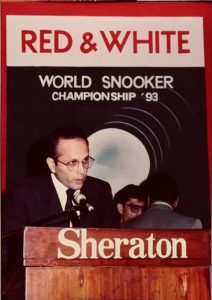
While recalling the developments of those times, veteran journalist Ehsan Qureshi highlighted that the era of Snooker’s fame started when Asghar Ali Valika (President of PBSA) and Lakson Group’s brand Red & White joined hands for the 1991 National Snooker Championship. The event was masterminded by a famous name in the marketing and advertising industry of Pakistan – Ahmed Kapadia, who was working with Lakson Group at the time and is now the CEO of his own communications group called “Synergy Group.” The event got a sponsorship of Rs 4 million, allowing Pakistan to witness an extravagant Snooker event for the first time at the national level.
The brand partnership stretched to organize the Asian Snooker Championship in 1992. Ehsan recalled that it was the first major Snooker event that got telecasted on Pakistan Television (PTV) due to the strong involvement of a big brand. In a quick span, the Red & White brand got associated with Snooker & the sport became a raging hit across the country.
The partnership went on to organise the 1993 IBSF World Snooker Championship. With an eye-glaring financial back of Rs 15 million, the game earned a perfect placement and mass appeal. This event became the stepping stone of Snooker’s roaring fame in Pakistan.
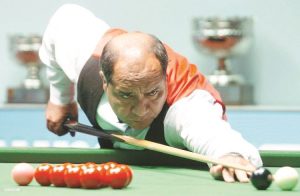
In the following year – 1994, pride of Pakistan Muhammad Yousaf won the first major international snooker title for the country with a stunning performance in the IBSF World Snooker Championship held in Johannesburg, South Africa. His victory added more respect and stardom to the game.
The brand involvement and consistent victories of Pakistani players kept the financial situation of the game at a prime level. Pakistani players continued to shine as Muhammad Yousaf won the ACBS Asian Snooker Championship in 1998, and Shokat Ali won the gold medal in the singles event of the 1998 Bangkok Asian Games and a bronze medal with Saleh Mohammad. Similarly, Saleh Mohammad and Naveen Perwani paired to win the bronze medal in the team category. Saleh Mohammad remained runners-up in the 2003 IBSF World Snooker Championships.
That was the era when, in every area of large cities, one could see a Snooker club where young boys would gather to religiously play and practice.
The sponsorship from the brand made the game financially viable and allowed players to shine, as much of their expenses were borne by PBSA & brand. But in 2005, the Framework Convention on Tobacco Control by the World Health Organization banned advertising, promotion, and sponsorship of tobacco. This resulted in the removal of all cigarette-related branding from all fronts used for marketing purposes.
Snooker’s Suffering for Recognition in Pakistan
Some people believe that Pakistani players don’t have the potential to compete in International Snooker, and that has pushed the sport back in terms of fame. But on the contrary, Pakistani players kept bringing pride to the country’s name with consistent victories. For other sports, it could be said that lack of noteworthy performances pulled down their fame, but in the case of Snooker, we never fell short of achieving notable triumphs but fell short of support from sponsors.
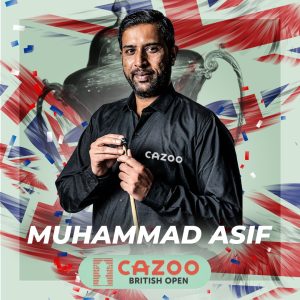
Muhammad Yousaf won the IBSF Seniors/Masters World Championship in 2006. Then in 2010, Mohammad Sajjad was the runner-up of the ACBS Asian Snooker Championships held in Thailand, and in the Asian Games of 2010, Pakistan’s team (Imran Shahzad, Sohail Shahzad, and Shahram Changezi) won the bronze medal. A great feat came in 2012 when Mohammad Asif became the new World Champion by winning the IBSF World Snooker Championships in Bulgaria. In the following year, Mohammad Asif and Mohammad Sajjad won the 2013 IBSF World Teams Snooker Championship.
In 2014, a new talent came into the Pakistan Snooker realm when the 21-year-old Hamza Akbar qualified for the semi-finals of the 2nd Asian Team Championship in Karachi. Hamza Akbar brought the honour of Asian Champion to Pakistan by winning the Asian Championships in Kuala Lumpur.
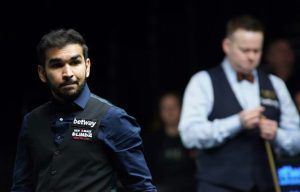
While talking about the state of the game, Hamza claimed that Snooker holds more followers than any other sport but it falls short of having the due recognition because of inadequate financial support, “I think no game has won more medals than snooker for Pakistan. At the club level, this sport still has more followers than other games. But despite continuous wins, players are not sponsored by any organization,” expressed Hamza Akbar.
About the finances involved in playing Snooker professionally, Hamza explained that it is a very expensive practice and anyone who wants to play professionally needs a decent amount of money. Due to the continuous financial backlash, the club level of Snooker also deteriorated. This means that players now have fewer facilities to train and brush up their skills. Hamza said the business of the snooker club is slowly decreasing which is affecting the overall upbringing of this sport. He added that if the situation continues, then no good junior player is going to be seen in the near future.
Hamza believes that the involvement of good brands will help uplift the situation of Snooker as it’s an expensive sport and needs financial backing. He pointed out that in Pakistan, snooker has been limited to only one or two events due to the absence of sponsors. This has pushed many snooker players to play Q School – an amateur snooker competition through which players can qualify for the World Snooker Tour.
Those who say that snooker nose-dived in Pakistan should know that our players left no stone unturned in dominating major competitions. The shortage of brand involvement in snooker stole the charm from the game. From 2016 to 2019: Pakistan won the team event of the 1st Asian Billiards Sports Championship, the Under-18 IBSF World Championship, the 1st IBSF World Team Cup, the 7th Asian Team Snooker Championship, and the World Snooker Championship for the second time.
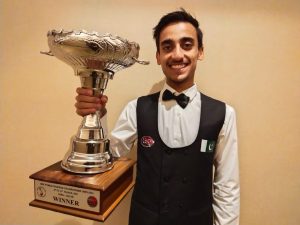
Pakistani player Ahsan Ramzan made history by becoming the youngest player to win the World Snooker Championship at the age of 16 and recently won the Asian U-21 Snooker Championship. Even at the professional level, M. Asif has started to earn recognition as he thrashed 7X World Champion Stephen Hendry in the British Open ’23.
What can be the reason for brands keeping a distance?
Every expert has their own theory when asked why no brand gets connected to snooker like the one did in the 90s. Even though National Bank gives support to it, and previously, Jubilee Insurance also took part as a sponsor, snooker’s image is still not as big as it should be.
Some say it’s because of internal complications in PBSA. Others think that conflicts between IBSF and WSF make it hard for companies to take part in branding. But the bottom line is that organisation-level issues are ultimately haunting brands and, subsequently, the future of Snooker. Moreover, in the current political and financial chaos in Pakistan, it seems difficult for any applaudable development to take place anytime soon.
The situation would only change if someone like Ali Asghar Valika took a personal interest in rectifying the problems and re-branding Snooker. Like several other areas of our country, the disinterest of the government also hinders its growth. It may be because when it comes to sports, their concentration is just on the growth of selective games that have popularity. More sadly, Snooker – like many other games and departments, is also facing a situation of brain drain. Many talented players fled to other countries, and if the trend continues, Snooker will become one of the lost stories in Pakistan’s history

